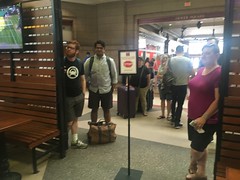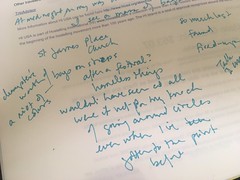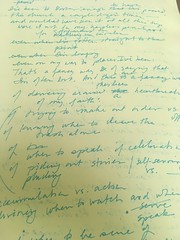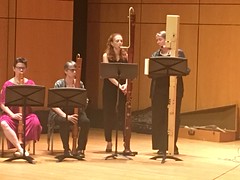[July 14]
Something I like about travel is that it kicks my “everything can become a subject line or poem seed” mindset into a higher gear. I’d thought about stopping by Happy Lamb Hot Pot on my way to South Station, but it doesn’t open on Sundays until noon, and I’d already used up my cutting-things-close quotient yesterday, when I capped my 79-hour work week by setting off alarms at the Southwest kiosk by checking my luggage in late. One failed geocaching attempt and beer request later (Tavern in the Square being out of Lord Hobo Brewing Boom [sic] Sauce, I’m chilling out with tortilla soup, a pint of Devil’s Purse Pollock IPA, and the ideal pair of screens (Federer-Djokovic next to the departing train list) in front of me:
[July 21]
… and I was not so chill as Federer came oh-so-close to winning the championship. It was fun, though, to watch and listen to the other occupants of the bar cheer and moan in response to the rallies, the aces, and the misses, and as the set stretched on, the clusters of onlookers on three sides of the bar thickened:
The night before, I’d ended up walking past St. James the Greater twice on my way from the Silver Line stop to the hostel. [It was past midnight by the time I reached the hostel, I had a 1 p.m. train to catch, and (as feared) I was running on fumes with work still in tow, so I didn’t try to meet up with any friends this round.] That said, if I hadn’t been hauling two weeks’ worth of clothes and music/dance paraphernalia with me, I still might have been tempted to wander around until 2 a.m., to see more and take notes. (One trickle of people included several Asian women holding armfuls of flowers, reminding me of the pageant contestants I spotted two Mays ago in San Francisco, during another walk that ended up being less straightforward than planned.)
Instead, I scribbled a few lines to myself in Bunk #4 before sacking out and, over two bagels and a bowl of coffee, wrestle-teased them into the start of something more:
I’ll return to it in August, perhaps. Right now I’m at the Amherst Early Music Festival, and it’s wrenching enough having to choose among things I can enjoy only while here (practicing on lutes and harpsichords in particular), pursuits that would arguably provide larger returns were I to devote myself more fully to them (e.g., building vocal and keyboard chops), time with people, time with trees, time in/on water, time on postcards (to voters, decision-makers, and others),
and so on. And, like on Friday, sometimes the right move is to nap instead of practice, even when one feels woefully underprepared for, say, playing quartets. Or to seek out a keyboard in a nearly empty building long after nightfall instead of attending a party. Sometimes I feel pangs about the many details that will evaporate from my memory sooner than later because I’m not journaling like I used to — but, even back then, there were poems I started and then lost momentum on. There’s a sliver of me that hasn’t let go of finishing the one about the Christian Science Center pool, keeping company with the Past Mes who put her feet wrong every which where — including just yesterday. (The good thing is that as I get older I have gotten a smidge faster at getting over myself.)
Surrounding all this, of course, is delight and wonder. I’m mopping my face and neck and cleavage every three minutes, and the little breezes that do make it through my open window feel all the more divine. Someone down the hall is playing their violin. Most of the faculty members and many of the students are accomplished musicians. There are heart-tugging phrases in the Rameau pieces I’ve been inflicting on the harpsichords, and there are encounters with, say, bass recorders that look like contemporary public art:
I hadn’t planned on drafting any new poetry during this trip, what with the intensity/immersive pace I knew to expect, so to have a poem insist on getting started — those three pages above — that too is a gift.





